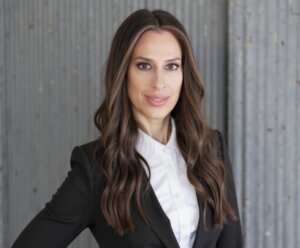Uncategorized
Jonathan Safran Foer’s online flirtation with Natalie Portman inspires a new play
(New York Jewish Week) — When Jewish literary power couple Jonathan Safran Foer and Nicole Krauss divorced in 2014 — amid rumors that he was in love with his longtime friend Natalie Portman — it captivated the nation.
Well, maybe not the nation, but certainly the literary and media worlds, as well as the hipster set in brownstone Brooklyn. Safran Foer and Krauss were rare literary megastars, whose “extremely loud and incredibly expensive” Park Slope brownstone was the subject of numerous articles (and a hefty dose of envy) when it hit the market for $14.5 million in 2013.
Portman, of course, was an actual megastar, and when the confessional correspondence between the celebrated actress and the “Everything Is Illuminated” writer was later published in 2016 in the New York Times, it elicited a fresh round of jealousy, speculation and eye-rolls from the masses, as well as numerous journalistic “takes” on the topic.
I was a teenager at the time, and had only a vague idea of why any of this mattered. But apparently it stayed with me for nearly a decade, because when I saw “The Wanderers,” a new Off-Broadway play running at the Roundabout Theatre Company, it didn’t take long for me to make the connection between this fictional production and the very real but mysterious drama that occurred between these famous Jewish writers.
“The Wanderers,” directed by Barry Edelstein, follows two couples in two different timelines. In the present day are Abe and Sophie, secular Jews and writers who live in Brooklyn and have been together since they were teenagers. The other storyline, set in the 1970s, centers around Esther and Schmuli, a Hasidic couple living in Satmar Williamsburg. The latter are introduced to the audience on the eve of their wedding, one of the first times they’ve ever been alone together.
Throughout the play, the couples, seemingly from different worlds, try to balance their careers, personal lives, internal desires and family obligations.
Abe (Eddie Kaye Thomas) is a writer who boasts a Pulitzer Prize and several other literary awards. But he struggles with certain aspects of his life — his frayed relationships, mostly — and is hamstrung by an immense ego that is tempered only by a hefty dose of insecurity. As I watched the play, I began to feel like I knew the man, but I couldn’t quite place him. Was he just a stand-in for every genuinely talented, semi-pretentious, self-important male writer living in Brooklyn?
Abe eventually finds an outlet for his woes by striking up an email correspondence with fictional Hollywood actress Julia Cheever (Katie Holmes, the real Hollywood actress), whom he met when she came to a reading of one of his novels. Eventually, he declares his love for her — a pronouncement that essentially goes ignored by the actress. (In the play, Holmes sports a chic brunette bob not unlike a Jewish actress near and dear to our hearts.)
It became pretty clear who served as the inspiration for this play — and when I asked playwright Anna Ziegler about it, she said I was one of the few she had spoken with who had made the connection.
“In the summer of 2016, when I was writing, Natalie Portman and Jonathan Safran Foer were writing to each other in a correspondence they published in the New York Times,” she said. “She was promoting a new movie of hers, and I guess they had a previous relationship — that sparked the idea for one of the storylines in the play.”
What’s funny, Ziegler said, was that most audience members haven’t made the connection. “We haven’t really been talking about [Safran Foer and Portman] as one of the inspirations, and not many people have raised it,” she said. “I assumed that that resonance would be there for a certain percentage of the audience but, to be honest, I don’t think it’s there for the vast majority of people.”
At one point in the play, after learning his father died, Abe even says the line “Hineni, here I am,” to ground himself and calm his emotions. It’s a phrase in the Torah that usually translates to “I am ready,” which Abraham says to God before being asked to sacrifice his son, Isaac, as well as a prayer of humility chanted on Rosh Hashanah. But it’s also, possibly, a nod to Safran Foer’s 2016 novel “Here I Am.”
Neither Krauss nor Safran Foer responded to requests for comment on the play. “For people in my generation and younger, the recognition might be there, but it was also so many years ago now,” said Zielger, 44. “So I guess the only people who remember it are the people on whom it made an impact.”
Which is fine — “The Wanderers” stands on its own even if you don’t know the backstory. Plus, the themes of the play stretch far beyond infidelity: It also explores loneliness, free will and inherited family trauma.
Originally, Ziegler set out to write something about arranged marriages, specifically within the Jewish community. “I had always been kind of fascinated and beguiled by the idea of arranged marriage — thinking about what it would be like spending that first night together, that notion always kind of haunted me,” she said.
“I had these two different plays [one about Portman and Safran Foer and the other about arranged marriages], and they seemed thematically related,” she added. “At some point, I concluded that they really were two strands at the same play and so I started weaving them together.”
Ziegler chose to write about the Hasidic Jewish community in particular because she was “somewhat familiar with that culture and community,” she told me.
Still, as a secular Jew, it’s a topic she approached delicately. She hired a cultural consultant and an accent coach for the actors who were both from the community. Ziegler herself, who lives in Brooklyn, spent time in Williamsburg, and read memoirs and watched documentaries.
In the play, the Hasidic wife Esther (Lucy Freyer) struggles to be seen by her community and to feel in control of her life. She doesn’t know where to turn and wonders if she’s fulfilled her potential — as a parent, wife, human and Jew. “One of the great joys of being an actor is being able to learn and dive head first into a community that you ordinarily wouldn’t get to know,” Freyer said.
As the story unfolds, it’s revealed that Esther left the community with her infant son, who grows up to be the renowned Jewish author Abe, who marries his childhood friend Sophie (Sarah Cooper, the comic and actress who broke big with videos mocking Donald Trump). The younger couple is almost entirely secular, yet they grapple with the same search for meaning and belonging, the same doubt as to whether they’ve chosen the right path for themselves — or if it had been chosen for them.
“All five characters, not just Schmuli and Esther, are trying to figure out how can you be happy with what you have, with where you stand in your own skin,” said Dave Klasko, who plays Schmuli.
“We say in the play the Hebrew phrase, ‘Ein ba’al hanes makir b’niso,’ which [Ziegler] poetically translates to ‘We are never aware of the miracles, especially when we are inside them,’” Klasko added. “How can I, in my own life, realize the miracle that I’m living in before I’m on the other side of it?”
For Ziegler, these are very Jewish questions — and the questions of the “Xillennial” generation. “We’re left [with] the complex heritage of feeling chosen, but also self-hating,” said Ziegler, whose previous plays include “Photograph 51,” about Rosalind Franklin, the Jewish X-ray crystallographer who helped Watson and Crick crack the DNA model. “I think this is the most Jewish of my plays, and it’s funny because I’m not that religious, but I have found in my career that there seems to be a hunger for plays about Judaism.”
“At some point in my career, I began to be thought of as a ‘Jewish writer’ — for better or for worse,” she added.
Safran Foer, 46, and Krauss, 48, have also wrestled with the “Jewish writer” term, as well as the play’s big questions of identity, self-doubt and complicated family relationships. In fact, as Ziegler and the actors point out, issues of the play are universal, and have nothing to do with how famous you are, how expensive your home may be, or how strictly you adhere to religious law. The celebrity allusion — plus the chance to see an actual celebrity, Holmes — may be a reason to buy a ticket to see “The Wanderers,” but the timeless message is what will keep you in your seat.
“The Wanderers” is playing at the Roundabout Theatre Company (111 West 46th Street) through April 2. Find tickets and more information here.
—
The post Jonathan Safran Foer’s online flirtation with Natalie Portman inspires a new play appeared first on Jewish Telegraphic Agency.
Uncategorized
A border official mocked an attorney for observing Shabbat. Orthodox lawyers say the issue is not new.

Gregory Bovino, the Border Patrol official who led immigration raids in Minneapolis, reportedly mocked the Jewish faith of Minnesota’s U.S. attorney during a phone call with other prosecutors in mid-January. According to The New York Times, Bovino complained that Daniel Rosen, an Orthodox Jew, was hard to reach over the weekend because he observes Shabbat and sarcastically pointed out that Orthodox Jewish criminals don’t take the weekends off.
The call took place at a moment of extreme tension in Minneapolis, as federal agents under Bovino’s command carried out an aggressive immigration crackdown that had already turned deadly. It came between the fatal shootings of Renée Good and Alex Pretti, both killed during enforcement operations, and amid fierce backlash from local officials and residents.
Bovino made the remarks in a derisive, mocking tone, the Times reported, casting Shabbat observance as a point of ridicule. Bovino had already drawn national attention for frequently wearing an olive double-breasted greatcoat with World War II-era styling, leading some critics to call him “Gestapo Greg” and accusing him of “Nazi cosplay.” Bovino, who pushed back on those comparisons, has since been reassigned.
Rosen, a Trump nominee, was confirmed as Minnesota’s U.S. attorney in October 2025 after a career in private practice and Jewish communal leadership. He has said that rising antisemitism helped motivate his decision to take the job, and that prosecuting hate crimes would be a priority for his office.
For many Orthodox Jewish lawyers, Bovino’s alleged remarks were not surprising. They echoed a familiar challenge: explaining that Shabbat — a full day offline — is not a lack of commitment, but a religious boundary that cannot be bent without being broken.
In a profession that prizes constant availability, that boundary can carry consequences. Some lawyers say it shows up in subtle ways: raised eyebrows, jokes about being unreachable, skepticism when they ask for time off. Others say it has shaped much bigger decisions, including how visibly Jewish they allow themselves to be at work.

David Schoen, an Orthodox criminal defense attorney who served as lead counsel for President Donald Trump during his second impeachment trial, said he has long been mindful of how religious observance is perceived in the courtroom.
“I have made a conscious decision not to wear my yarmulke in front of a jury,” Schoen said, explaining that jurors often “draw stereotypes from what they see.”
Those concerns were reinforced by experience. Schoen said he has noticed a “definite difference in attitude” from some judges depending on whether he wore a yarmulke. In one case, he recalled, a Jewish judge pulled him aside during a jury trial and told him she thought he had made the right choice — a comment Schoen said he found disappointing.

For Sara Shulevitz, a criminal defense attorney and former prosecutor, the Bovino episode brought back memories from early in her career.
Orthodox and the daughter of a Hasidic rabbi — now married to one — Shulevitz said her unavailability on Jewish holidays was often treated as a professional flaw rather than a religious obligation. “It held me back from getting promotions,” she said.
In court, the scrutiny could be blunt. “I was mocked by a Jewish judge for celebrating ‘antiquated’ Jewish holidays,” she said, recalling requests for continuances for Shemini Atzeret and Simchat Torah. In another case, she said, a judge questioned her request for time off for Shavuot and suggested she had already “taken off for Passover.”
When another judge assumed Passover always began on the same day in April, “I had to explain the Jewish lunar calendar in the middle of court while everyone was laughing,” she said.
Not every encounter, Shulevitz added, was rooted in hostility. Sometimes judges simply didn’t understand Orthodox practice. When she explained she couldn’t appear on a Jewish holiday, judges would suggest she join the hearing by Zoom — forcing her to explain that Orthodox Jews don’t use electrical devices on Shabbat or festivals.
The misunderstanding often slid into a familiar assumption. “They think you’re lazy,” she said. “It’s not laziness. Any Jewish woman knows how much work goes into preparing for Passover.”
Rabbi Michael Broyde, a law professor at Emory University who studies religious accommodation, said that Bovino’s alleged “derogatory remarks” are “sad and reflects, I worry, the antisemitic times we seem to be living in.”
He added that the criticism of Rosen reflected a basic misunderstanding of how law offices operate, calling it “extremely rare” for a lawyer’s religious practices to interfere with their obligations, especially when senior attorneys delegate work and courts routinely grant continuances.
“No one works 24/7,” Broyde said.
The episode echoed a similar Shabbat-related incident during Trump’s first term. In his 2022 memoir, former Trump trade adviser Peter Navarro described how a group sought to undermine Trump son-in-law Jared Kushner’s role in the 2020 campaign by scheduling a key White House meeting with Trump on a Saturday, knowing Kushner — who is Shabbat observant — would not attend. Navarro titled the chapter recounting the episode, “Shabbat Shalom and Sayonara.”
The tension between Jewish observance and public life is not new. Senator Joe Lieberman, the first observant Jew to run on a major-party presidential ticket, famously walked to the Capitol for a Saturday vote and ate fish instead of meat at receptions. His longtime Senate colleague Chris Dodd joked that he became Lieberman’s “Shabbos goy.”
Still, Schoen said, visibility can cut both ways. During Trump’s impeachment trial, while speaking on the Senate floor, he reached for a bottle of water and instinctively paused. With one hand holding the bottle, he used the other to cover his head — a makeshift yarmulke — before drinking.
The moment was brief, but it did not go unnoticed. In the days that followed, Schoen said he heard from young Jewish men and businesspeople who told him that seeing the gesture made them feel more comfortable wearing their own yarmulkes at work.
The attention, he said, was unexpected. But for some in the Orthodox community, it became a source of pride.
“I felt honored,” Schoen said.
My guess in all seriousness is that he normally wears a yarmulke and this was reflex. Schoen is modern Orthodox so that would make sense. But I defer to @jacobkornbluh https://t.co/MkKx6W03v2
— Jake Tapper 🦅 (@jaketapper) February 9, 2021
Jacob Kornbluh contributed additional reporting.
The post A border official mocked an attorney for observing Shabbat. Orthodox lawyers say the issue is not new. appeared first on The Forward.
Uncategorized
Deni Avdija becomes first Israeli to be selected as an NBA All-Star
(JTA) — Portland Trail Blazers star Deni Avdija’s meteoric rise has officially reached a new stratosphere, as the 25-year-old forward has become the NBA’s first-ever Israeli All-Star.
Avdija was named an All-Star reserve for the Western Conference on Sunday, an expected but deserved nod after the northern Israel native finished seventh in All-Star voting with over 2.2 million votes, ahead of NBA legends LeBron James and Kevin Durant. Avdija’s breakout performance this season has earned him repeated praise from James and others across the league.
Avdija’s star turn began last year in his first season with Portland, when he further captured the adoration of Jewish fans across Israel and the U.S. But he took another step forward this season, averaging 25.8 points, 6.8 assists and 7.2 rebounds per game. His points and assists clips are by far the best of his career, and rank 13th and 12th in the NBA, respectively. He’s considered a front-runner for the league’s Most Improved Player award.
For close observers of Israeli basketball, Avdija’s All-Star selection is the culmination of a promising career that began as a teenage star with Maccabi Tel Aviv and made him the first Israeli chosen in the top 10 in an NBA draft.
“Deni Avdija being named an NBA All-Star reserve is an unbelievable achievement in the mind of every Israeli basketball fan,” Moshe Halickman, who covers basketball for the popular Sports Rabbi website, wrote in an essay for the Jewish Telegraphic Agency. “This is a dream come true for many — a dream that became realistic and even a must-happen during his breakout season — but something that in his first five seasons in the NBA never came across as something that was going to be real.”
Halickman, who has covered Avdija in Washington, D.C., and in Israel, wrote that Avdija is not only considered the greatest Israeli hooper of all time, but perhaps the best athlete to come out of Israel, period.
Oded Shalom, who coached Avdija on Maccabi Tel Aviv’s Under-15 and Under-16 teams, echoed that sentiment in a recent profile of Avdija in The Athletic.
“Even though he is only 25, I think he is Israel’s most successful athlete in history,’’ Shalom said. “We’ve had some great gymnasts — and I hope everyone forgives me for saying it, because we’ve had some great athletes — but I think Deni has become the greatest.”
Avdija’s ascension has also come against the backdrop of the Gaza war and a reported global rise in antisemitism, which he has said affects him personally.
“I’m an athlete. I don’t really get into politics, because it’s not my job,” Avdija told The Athletic. “I obviously stand for my country, because that’s where I’m from. It’s frustrating to see all the hate. Like, I have a good game or get All-Star votes, and all the comments are people connecting me to politics. Like, why can’t I just be a good basketball player? Why does it matter if I’m from Israel, or wherever in the world, or what my race is? Just respect me as a basketball player.”
Now, Avdija’s talents will be on display at the NBA All-Star Game, on Sunday, Feb. 15, in Los Angeles.
The post Deni Avdija becomes first Israeli to be selected as an NBA All-Star appeared first on The Forward.
Uncategorized
Democratic leader says GOP-led Congress boosted ICE funding while Jewish security is underfunded

House Democratic Leader Hakeem Jeffries used a Jewish gathering in New York on Sunday to spotlight what he described as an imbalance in federal priorities, building on outrage over the Trump administration’s violent crackdown in Minneapolis that resulted in two fatal shootings.
Jeffries criticized the Republican-controlled Congress for boosting immigration enforcement funding by billions while, he said, security funding for Jewish institutions continues to lag amid rising antisemitic threats. He said that in the One Big Beautiful Bill Act, which passed last July and included cuts to Medicaid, the Department of Homeland Security received an additional $191 billion, including $75 billion for ICE.
“If that can happen, then the least that we can do is ensure that this vital security grant program is funded by hundreds of millions of dollars more to keep the Jewish community and every other community safe,” Jeffries said.
The Nonprofit Security Grant Program, established by Congress in 2005 and administered by FEMA under the Department of Homeland Security, provides funding to nonprofits, including houses of worship, to strengthen security against potential attacks. Congress began significantly increasing funding in 2018 after a wave of synagogue attacks nationwide, bringing the program to $270 million today.
Major Jewish organizations are pushing to raise funding to $500 million amid rising antisemitic threats. Last year, the Trump administration briefly froze the program as part of broader agency cuts, and some groups have been reluctant to apply because applicants must affirm cooperation with federal immigration enforcement.
Jeffries said House Democrats strongly support an increase to $500 million annually to meet escalating security needs. “It’s got to be an American issue, because that is what combating antisemitism should be all about,” he said.
The breakfast, previously held at the offices of the UJA-Federation of New York, was held this year for the first time in the events hall at Park East Synagogue, which was the site of a pro-Palestinian protest last year that featured antisemitic slogans and posters.
Sunday’s program also included remarks from Senate Minority Leader Chuck Schumer, who told the audience that his support for Jewish security funding will only continue growing under his leadership, calling it his “baby.”
“As long as I’m in the Senate, this program will continue to grow from strength to strength, and we won’t let anyone attack it or undo it,” Schumer said.
Rep. Jerry Nadler, the co-chair of the Congressional Jewish Caucus who is retiring at the end of the year after 36 years in the House, also spoke at the event. Nadler, like several other Democrats in recent months, compared the actions of ICE agents to the Gestapo, Nazi Germany’s secret police. The comparison has drawn sharp criticism from Democrats, Republicans and Jewish leaders.
Support for Israel aid

Both Schumer and Jeffries vowed in their remarks to continue supporting U.S. military assistance to Israel, amid increasing calls within the party for sharper opposition to Israel. Polls show that Democratic voters are increasingly sympathetic to Palestinians. In July, a record 27 Senate Democrats, a majority of the caucus, supported a pair of resolutions calling for the blocking of weapons transfers to Israel.
“I think it’s the humane thing to do to ensure that Israel has a right to exist as a Jewish and democratic state and eternal homeland for the Jewish people,” Jeffries said. The House Minority Leader, who has cultivated close ties with Jewish leaders since his election in 2012, noted that he has visited Israel nine times. He recalled that on his recent trip, Israel’s ambassador to the U.S., Yechiel Leiter, joked that it might be time for Democrats to buy property in Jerusalem.
Schumer, the nation’s highest-ranking Jewish elected official, has seen his popularity decline and has faced calls to step down from his role as leader. On Sunday, he pledged that he “will always fight to give Israel what it needs to protect itself from the many who want to wipe Israel off the face of the map.”
The post Democratic leader says GOP-led Congress boosted ICE funding while Jewish security is underfunded appeared first on The Forward.


